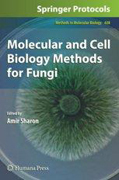
With the development of fungal transformation systems and the deciphering of an increasing number of fungal genomes, this diverse clade of heterotrophic eukaryotic organisms has proven to be ideal for molecular work and highly serviceable as model systems to study basic processes with results that are applicable to many organisms, including humans. In Molecular and Cell Biology Methods for Fungi, experts in the field provide an up-to-date set of practical protocols covering a range of frequently used methods used to study molecular and cellular aspects of fungal biology. The included classical protocols such as transformation systems and traditional protein analysis methods, which have been widely used for many years, alongside the most advanced techniques such as genome amplification, whole genome knockout methods, and sophisticated in vivo imaging techniques will prove to be easily adaptable and useful in a wide range of species. Written in the highly successful Methods in Molecular Biology™ series format, chapters include introductions to their respective topics, lists ofthe necessary materials and reagents, step-by-step, readily reproducible laboratory protocols, and notes on troubleshooting and avoiding known pitfalls. Comprehensive and up-to-date, Molecular and Cell Biology Methods for Fungi seeks to provide cutting-edge techniques in order to aid both experienced fungal research laboratories as well as those that are interested in using fungias hosts to study their favorite genes."
- ISBN: 978-1-60761-610-8
- Editorial: Springer
- Encuadernacion: Cartoné
- Páginas: 321
- Fecha Publicación: 01/01/2010
- Nº Volúmenes: 1
- Idioma: Inglés
